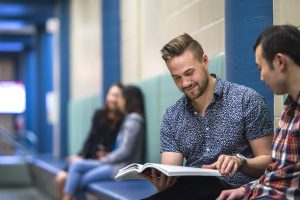2.5 Learning Challenges
Opportunity
- What are some challenges that get in the way of learning?
- What are some specialized learning needs that face students?
- What resources are available to support specialized learning needs?
Learning Challenges
Everyone faces challenges in learning at different times and to different degrees. There are many factors that will affect people’s ability to learn. Some are circumstantial (e.g. parenting young children)  or environmental (e.g. adapting to a new culture or an online learning environment) while others are self-inflicted (e.g. consistently staying up too late), and yet others are barriers that are more challenging to deal with (e.g. learning disabilities).
or environmental (e.g. adapting to a new culture or an online learning environment) while others are self-inflicted (e.g. consistently staying up too late), and yet others are barriers that are more challenging to deal with (e.g. learning disabilities).
Whatever the challenge, you will need to apply all of the Job Skills for the Future (Appendix A) to identify strategies and supports to help you through. It’s different for everyone, but you are definitely not the only student who is dealing with significant challenges.
Spending time identifying your own personal learning challenges will ensure you find the right resources to help.
Systemic Barriers
Challenges can be inherent in institutions. If things like racism, discrimination, harassment, inclusion, sexual violence, or gender bias are impacting students, they may be struggling with emotional or mental health issues. They may be struggling with feeling safe, feeling respected and valued, being understood, or being accepted. Often students are not aware of how systemic challenges can impede their learning. These kinds of repetitive stressors can cause ongoing problems with memory, retention, and focus.
More information on who can help with this can be found in Chapter 6.
 One new contact you could add to your support team is the Office of the Ombuds. They provide guidance in dispute resolution for students and consultation services for all members of the College community who interact with students.
One new contact you could add to your support team is the Office of the Ombuds. They provide guidance in dispute resolution for students and consultation services for all members of the College community who interact with students.Office of the Ombuds
Accessibility
The idea of “accessibility” is an important force of change on college campuses today. Accessibility is about making education accessible to all, and it’s particularly focused on providing educational support to a diverse group of students, faculty, and staff with disabilities. Colleges offer support for those with permanent disabilities (and some temporary disabilities) such as:
- Mobility impairments
- Learning disabilities
- Mental health conditions
- Deafness or hard of hearing
- Visual impairments
- Attention deficit disorder
- Neurological disabilities or head injuries
- Chronic health problems
Video: Fanshawe is Here for You: Accessibility Services
Accommodations
Those with documented disabilities have special legal rights to certain accommodations. Even those whose disabilities are not diagnosed can receive some accommodations. Accommodations may include, but are not limited to, the following:
- Academic accommodations, like alternate format for print materials, classroom captioning, arranging for priority registration, reducing a course load, substituting one course for another, providing note takers, tutors, recording devices, sign language interpreters, a TTY in your dorm room, and equipping school computers with screen-reading, voice recognition, or other adaptive software or hardware
- Exam accommodations and the test centre (e.g. extended time on exams)
- Financial support and assistance
- Priority access to housing
- Transportation and access, like wheelchair-accessible community shuttles
Assistive technologies and web-accessibility accommodations are critical in today’s technology-driven economy and society. The following are some examples of assistive technologies:
- Software like Dragon Naturally Speaking, Kurzweil, Zoom Text, CCTV Magnifier, Inspiration Software
- Computer input devices, like keyboards, electronic pointing devices, sip-and-puff systems, wands and sticks, joysticks, trackballs, and touch screens
- Other web-accessibility aids, like screen readers, screen enlargers, and screen magnifiers, speech recognition or voice recognition programs, and Text-to-Speech (TTS) or speech synthesizers
Fanshawe supports diverse learning needs. Review the links at the end of this chapter for resources to help.
Watch and listen to Ralph (Leopard) Constantin talk about his experience with accessibility services at Fanshawe.
Video – This is Winning – Fanshawe College
Video: This is WINNING by Fanshawe College [2:52] transcript available.
“2.2 Learning Differences and Challenges” from College Success by Amy Baldwin & Open Stax is licensed under a Creative Commons Attribution License
Challenges like racism, discrimination, harassment, inclusion, sexual violence, or gender bias that can impact students ultimately leading them to struggle with emotional or mental health issues.
In educational institutions, accessibility is about making education accessible to all, particularly focusing on providing educational support to a diverse group of students, faculty, and staff with disabilities.
Accommodations such as alternate format for print materials, classroom captioning, arranging for priority registration, reducing a course load, substituting one course for another, providing note takers, etc.
Technologies that help people with disabilities in the execution of everyday tasks at school or work.

